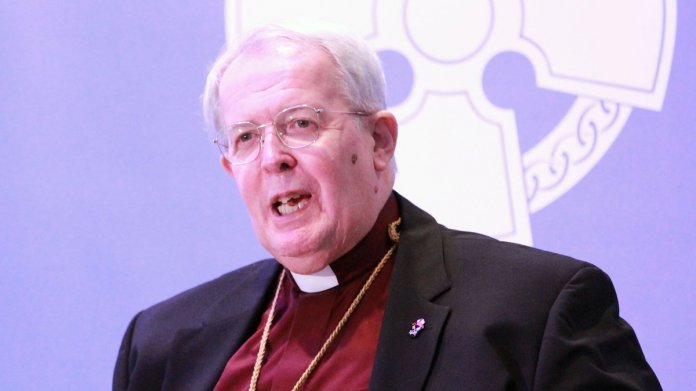The Bishop of St Asaph is warning that the Welsh Government’s Senedd Cymru (Members and Elections) Bill is “bad news” for democracy and accountability.
Bishop Gregory Cameron says one aspect of the bill in particular “rings alarm bells” for him. He fears that if passed, the Bill will mean that people will no longer be voting for an individual to represent them in their constituency. Instead, they will be voting for a party, and the party will select who represents each constituency.
In a letter to clergy, issued on Friday (1 March), Bishop Gregory wrote, “This is bad news as it severs the link between local representation and individual Senedd member’s performance. An individual who maybe loathed by the electorate can still be elected because they are loved by the party.
“This represents a huge shift of power away from the people and towards the politicians, since it is the politicians that will decide the personalities who get to work in our parliament, and no longer the people.”
The Senedd Cymru (Members and Elections) Bill is currently in its Second Stage and is due to be debated in the Senedd next week (w/c 4 March). If the bill is passed, the elections in 2026 will be held according to this new system.
Bishop Gregory added, “We should be able to eye-ball our politicians and decide whether we trust an individual and not a party. It’s perfectly acceptable for an individual to be chosen by a party and put forward as their candidate, but they know – for now – that they have to choose someone who can win the support of their constituency, and not some faceless party favourite.”
Every month, the Bishop of St Asaph issues a letter to clergy, known as an Ad Clerum, which is published on the diocesan website (https://dioceseofstasaph.org.uk/) and shared on social media platforms. The Ad Clerum contains news and information about forthcoming services and events as well as links to useful resources.
The text of Bishop Gregory’s letter, concerning the Bill, follows.
The process of preparing for the 2026 elections to the Senedd is underway, but as part of this preparation, the Welsh Government is proposing wide-ranging changes to the electoral system. If I have understood these proposals correctly – and they are not easy to follow or to understand – the number of Senedd members would rise to 96 – an increase of over a half. This may or may not be wise, but there is one aspect of the reforms which is attracting less notice, and which has appeared to avoid public scrutiny.
This is the change which rings alarm bells for me, as, if adopted, we would no longer be voting for individuals, but for parties only. The party, not the voters, gets to choose who represents us. This is bad news, because it severs the link between local representation and individual Senedd members’ performance. An individual who may be loathed by the electorate can still be elected because they are loved by the party. It promotes “company men” (and women) over locally accountable politicians.
This represents a huge shift of power away from the people and towards the politicians, since it is the politicians who will decide the personalities who get to work in our parliament, and no longer the people. I can see why a government of any complexion would like it because they can choose a membership of party “yes” people, rather than those personalities who command the confidence of their constituency. It was sometimes said that in certain parts of Wales, a particular party could nominate a donkey and that they would still get elected – but my point is that they would have been unwise to risk it. No longer – the majority party in an election would get exactly those politicians who curried the favour of the party and not of the people.
Why should a bishop worry himself with such questions on the Feast Day of our national saint? Because I care for democracy and accountability. When I was elected as your bishop in 2009, for good or for ill “Gregory Cameron” was chosen, not “an Evangelical” or “a Catholic” chosen by the particular Church party I was believed to represent. We should be able to eyeball our politicians and decide whether we trust an individual and not a party. It’s perfectly acceptable for an individual to be chosen by a party and put forward as their candidate, but they know – for now – that they have to choose someone who can win the support of their constituency, and not some faceless party favourite.










